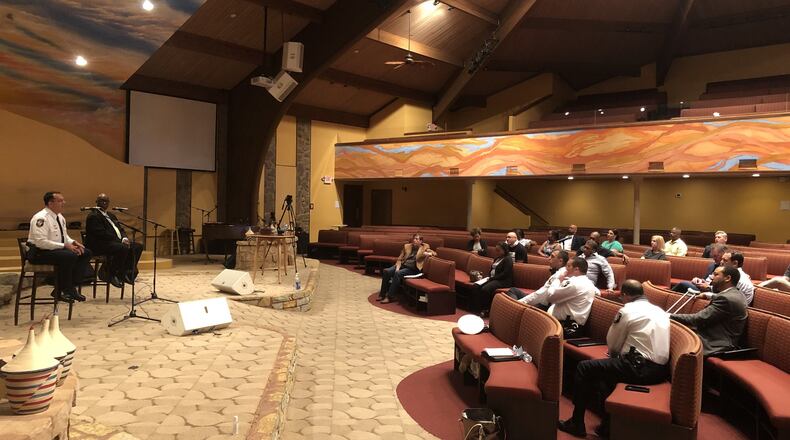“It starts with an uncomfortable conversation,” said Yasmen Brown-Jones, membership director of the chamber who organized the meeting Friday afternoon at Zion Global Ministries. “If we want to move the needle, we have to be uncomfortable.”
The event was one of many that officials around the area and the nation hope can happen in the coming weeks for conversations about race relations, hoping to bring in a variety of views.
At one point on Friday, Herzog admitted he didn’t change the tone of the conversation when his circle of friends discussed race, and Matt Miller, superintendent of Lakota Schools, said he just started addressing race after George Floyd was killed May 25 while handcuffed by police.
“It’s different now,” Miller said when asked how he perceives race. “I don’t know.”
Brown-Jones was impressed by the turnout of about 50 residents and their frank, sometimes emotional testimonies.
“This was a huge accomplishment for change,” she said after the event. “There were people listening and people heard. If we can touch a few white people or other Americans and teach them what our lives are like for years, that will help make change.”
Another woman, Ann Becker, said while growing up in north Toledo she lived in a very diverse Section 8 housing neighborhood. She was given a green card that indicated her school lunches were free. Black students had the same color cards, but they were teased by their classmates, she said.
Chamber President and CEO Joe Hinson said he grew up in the Princeton school district and played sports with mostly black students.
“That stuck with me,” he said. “Formed and shaped me today.”
He remembers after one road basketball game when a black player’s clothes from Princeton were stolen out of the locker.
Regarding race relations, his concern: “Don’t see it getting any better.”
Herzog was questioned why more police departments don’t have a better minority representation. He has hired black and female officers, but admitted “it’s really difficult to get them to apply.” His department recruits at the University of Cincinnati and Central State and Wilberforce University, two predominately black colleges.
One black man, a retired engineer, said between when he was 16 and 32 years old, he was pulled over by police 50 times, though he received two tickets. He has three sons and he’s “scared” every day they’re driving, he said.
Herzog was asked whether there are police departments that possible target black drivers.
“Yes,” he said. “That’s what has to stop. You can’t stop a car just to stop a car.”
For Herzog, it’s frustrating when the inappropriate actions of a few officers reflect poorly on his profession.
“I can’t change the outside,” he said. “I’m responsible for change inside. We are not what you see on TV. We are put in a box with all police officers. You’re doing the same thing as people who judge you because of your skin color.”
Another black man in the sanctuary said there’s one major difference. After their shift, the police officers can take off their uniforms.
“We will always be black,” the man said. “We will always be judged.”
As the event ended, Herzog left those in the audience with one final thought: “This is how we start. We need hard conversations.”
About the Author

